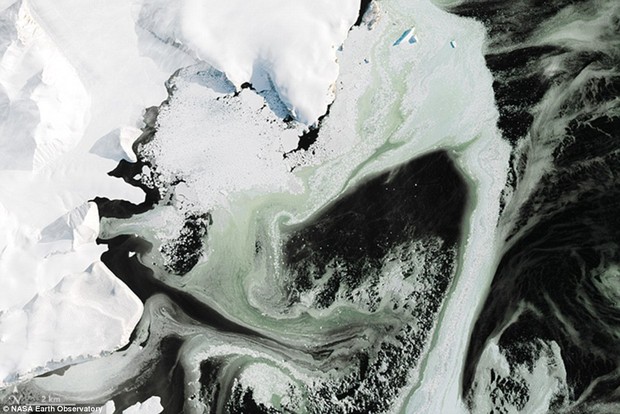The Antarctic ice caps suddenly appear eerily blue. Is this a bad omen?
Recently, a photo recorded a strange phenomenon appearing on the Antarctic ice caps, surprising many people. Specifically, blue icebergs suddenly appeared mysteriously in the Ross Sea.
We know that these strange icebergs were recorded by Operational Land Manager (OLI), a flying instrument on the American Landsat 8 satellite.
“This is a very natural phenomenon,” said Dr Jan Lieser of the Antarctic Climate and Climate Collaborative Research Center in South Australia.
The green of this ice is actually phytoplankton floating on the surface of the water – called Phytoplankton.
Phytoplankton or microalgae – are microscopic marine plants that float in the upper part of the ocean, where sunlight can hit the water.
These phytoplankton are similar to land plants, contain chlorophyll, and need survival and growth.
Phytoplankton thrive in the waters around Antarctica in the spring and summer in the southern hemisphere, when the ice edges melt and sunlight is more abundant.
Experts also say phytoplankton can thrive in the fall if the conditions are right.
According to Dr Lieser, phytoplantons are important for the ecology of the Antarctic Sea because they are a food source for zooplankton, fish, whales and other marine species.
In addition, with the warming of the Earth, the growth of these organisms will lead to the process of absorbing CO2 from the ocean and storing it for a long time.
A previous study found that at the peak of growth of phytoplankton microalgae, the organism was responsible for 20% of the CO2 absorbed in the Antarctic Sea – equivalent to 10% of the CO2 absorbed in the Antarctic Sea worldwide, with reserves that could reach millions of tons.
This means that the strong growth of phytoplankton is helping to defuse the current tense situation regarding climate change.
Dr Lieser and his colleagues continue to study this microalgae and hope they will make a breakthrough in the work of protecting the Earth.




